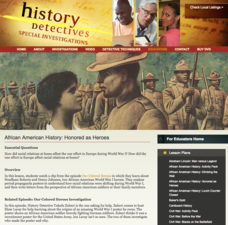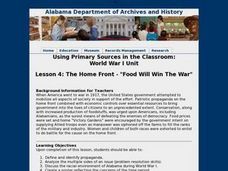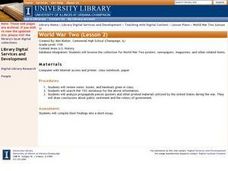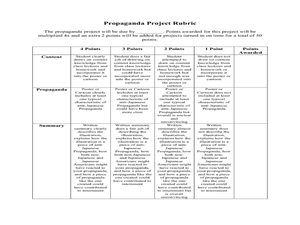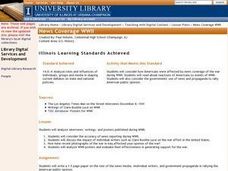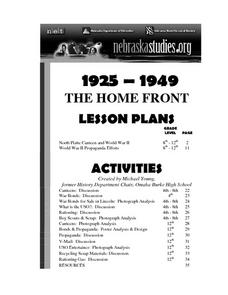Curated OER
The Rise of Hitler
Eleventh graders investigate how Hitler was able to harness Germany. In this World War II lesson, 11th graders conduct primary and secondary source research to determine how Hitler used the Great Depression, charisma, scapegoats, and the...
PBS
African American History: Honored as Heroes
To gain an understanding of the treatment of African American soldiers during World War I, class members watch an excerpt from the History Detectives film, Our Colored Heroes, and then examine three recruitment posters from that...
Curated OER
World War II: America on the Home Front
Eleventh graders gain a sense of historical time and historical perspective as they study the massive campaign that the U.S. government launched to convince Americans to conserve, participate, and sacrifice. They study cencorship, and...
Facing History and Ourselves
Laws and the National Community
When it comes to the law, is justice always served? Teach scholars about how law sometimes enables prejudice of entire groups of people with a unit on World War II that includes a warm-up activity, analysis of primary sources,...
Curated OER
The Home Front - "Food Will Win The War"
Pupils define and identify propaganda. They analyze the multiple sides of an issue (problem resolution skills), then discuss the racial environment of Alabama during World War I. They reate a poster reflecting the concerns of the time...
Curated OER
American Homefront
Seventh graders explore what life was like on the Homefront for Americans during World War II. They evaluate propaganda posters that were created during World War II. Students draw pictures depicting life on the American Homefront during...
Curated OER
WWII News Reporters
Learners develop their new reporting skills. In this World War II activity, students design propaganda posters and research human interest stories related to World War II. Learners create news report videos based in their research findings.
Smithsonian Institution
Mobilizing Children
Scholars find out how the government used propaganda to mobilize children to help in the war effort. Lesson exercises include analyzing a quote from Franklin Roosevelt, viewing propaganda images and posters, and participating in a lively...
Curated OER
Double V Campaign: Victory at Home and Victory Abroad
Learners write a persuasive essay as if they were an African American in World War II and decide if they would contribute war bonds or not. In this World War II lesson plan, students study the segregation of World War II and the unity...
Curated OER
Iwo Jima: Forgotten Valor
Students explore the nature of island combat on Iwo Jima during World War II. They examine the association between the Pacific Theater of World War II and Iwo Jima. Students evaluate Charles Lindberg's oral history, propaganda posters,...
Curated OER
World War Two- Lesson #2 of 3
Eleventh graders search an online database for World War II posters and other propaganda materials. They write an essay about public sentiment of the era based on their research.
Curated OER
Two World Wars
Learners listen to a lecture about WWI, or they go through the WWI project time line in a computer center. Students repeat the above options about WWII. Once the research is complete, learners compare the two wars by filling in the...
Curated OER
Japanese American Internment: Examining Racial Tensions
Students discover how racial tension led to Japanese Internment. In this World War II lesson, students analyze political cartoons and posters related to the movement of Japanese-Americans to internment camps in the wake of the Pearl...
Curated OER
Ny Secret War: Lesson 10
Fifth graders explore the role of propaganda during the war. In this social studies lesson, 5th graders view various forms of propaganda and design their own propaganda poster.
Curated OER
My Secret War: Lesson 12
Fifth graders explore how the war affected American children. For this social studies lesson, 5th graders discuss how quotes made people feel about the war effort. Students write reflections on their reading.
Curated OER
News Coverage WWII
Students explore how Americans were affected by news coverage of World War II.
Curated OER
The Holocaust
Eighth graders consider how something like the Holocaust could happen. In this Holocaust lesson plan, 8th graders analyze German propaganda that was used to garner support for World War II. Students discuss which pieces of propaganda...
Curated OER
North Platte Canteen and World War II
Students employ primary resources to investigate the rise and decline of a canteen in World War II. The significance of volunteerism and the use of the railroad for troop transportation are examined.
Curated OER
Events and Effects of World War I
Ninth graders explore the main events, key people, outcomes and lasting effects of World War I. They research the lasting effects of World War I on the 20th Century and discuss the Treaty of Versailles and its effects on Germany.
Curated OER
WW II Magazine
Eleventh graders search the database for pictures of WW II, photographs, posters, etc. They use the documents to support writing two magazine articles. The magazine articles be a minimum of 500 and maximum 1000 words.
Curated OER
Art and Patriotic Culture
Art forms, especially government-sponsored "poster art", very effectively conveyed specific cultural values during World War II. Understanding the role that visual images play in expressing issues and ideas is critical to developing...
Museum of Tolerance
Developing Media Literacy
To protect young people from questionable content, many schools limit access. This resource suggests that because learners can so readily avail themselves to unrestricted Internet access, it is vital for 21st century...
Curated OER
World War II Multimedia Newscast: History, Technology, Journalism
Students compose a multi-media newscast on various subjects relating to WWII to demonstrate their knowledge and ability to research.
Curated OER
To War or Not To War!
Ninth graders examine the various types of propaganda used during World War II. In groups, they make notes on each example and determine why they believe the opinion of the United States involvement in the war changed. They share their...



